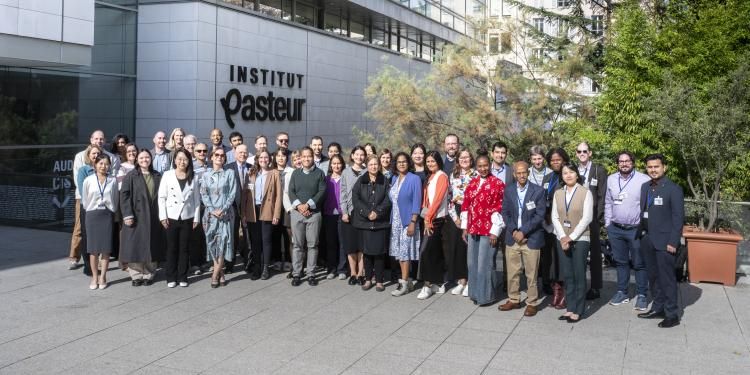PROSPECT
Meet PROSPECT, whose challenge is to determine why the incidence of early-onset cancers in adults is rising globally.

As part of the early-onset cancers challenge investigating the global rise of colorectal cancers in younger adults, team PROSPECT has published a new study suggesting that women under the age of 50 who consumed nearly 10 servings of ultra-processed foods (UPFs) per day had a higher risk of developing bowel polyps than those who consumed the least UPFs (3.3 servings per day). These early findings, led by PROSPECT Co-Team Lead Andrew Chan and published in JAMA Oncology, offer insight into how diet could influence early changes in the bowel that sometimes lead to cancer.
Thank you to our co-funders and partners for supporting the PROSPECT team: Cancer Research UK, the US National Cancer Institute, the Bowelbabe Fund for Cancer Research UK and the French National Cancer Institute.
Globally, rates of colorectal cancer in adults under 50 are increasing, but the reasons remain unclear. Team PROSPECT is working to uncover the causes behind this trend by exploring the potential role of diet, lifestyle, and the gut microbiome in the development of early-onset colorectal cancers (EOCRC).
Its latest analysis focuses on ultra-processed foods (UPFs). UPFs are industrially made products that often contain little or no whole foods such as processed sauces, crisps, processed meats and many ready meals. They tend to be higher in sugar, salt, unhealthy fats, and low in fibre and nutrients. They also often include things like colourings and emulsifiers. Some UPFs can be considered a part of a healthy, balanced diet, for example, fortified wholemeal bread, high-fibre breakfast cereals and baked beans.
The team analysed data collected from more than 29,100 women in the US. The women were aged 25-42 years at the start of the study and were followed over a 24-year period through the Nurses' Health Study and the Health Professionals Follow-up Study. By reviewing the food-frequency questionnaires that participants completed every four years between 1991 and 2015, researchers from team PROSPECT found that those who reported consuming the most UPFs – about 10 servings a day – had a 45% higher risk of developing conventional adenomas, compared to those who ate the least (3.3 servings per day). Whilst usually benign, these polyps can sometimes turn into cancer if left untreated. All women in the analysis had had a lower endoscopy to examine the lower portion of the colon and rectum before age 50, and around 1 in 25 women went on to develop polyps.
“Our study suggests these foods could be linked to a higher risk of developing polyps. However, more research is needed to confirm this link”, says Andrew Chan, PROSPECT Co-Team Lead and Chief of the Clinical and Translational Epidemiology Unit at Massachusetts General Hospital. “This means looking at larger and more diverse groups of people and investigating how the body responds to these foods to understand their role in early changes in the bowel.”
The researchers note that the study focused on US-based female nurses, who were predominantly white, from the US, and reported having a lower endoscopy before the age of 50, so it will need to be investigated further whether these findings reflect other groups. The data was also self-reported, which can make dietary recall less precise, as it relies on memory. Finally, while the study found a link between consumption of UPFs and polyp development, it didn’t directly measure whether benign polyps transformed into malignant lesions, so more research is needed before firm conclusions about cancer risk can be drawn.
“This study shows some of the PROSPECT team’s work in action, helping shed light on how diet and other factors are associated with gut health and changes in the bowel linked to cancer risk.” Says Charles Swanton, Chair of Cancer Grand Challenges' Scientific Committee. "While causation hasn’t yet been demonstrated, researchers around the world in the PROSPECT team are combining large-scale population studies with cutting-edge lab science to build a clearer picture of the factors that may be contributing to this trend, and how we might help reduce it in future generations.”
This is the first study to suggest a possible link between the consumption of UPFs and risk of bowel polyp development in younger women. Team PROSPECT is now working to understand whether these findings are consistent in other populations, and to understand the biological mechanisms behind the rise in EOCRC.
PROSPECT is one year into its Cancer Grand Challenges funding. By integrating epidemiological data with laboratory models, the team aims to uncover how early life exposures, from diet to the microbiome, may contribute to the development of EOCRC in younger adults. Co-led by Andrew Chan at Massachusetts General Hospital and Yin Cao at Washington University in St Louis, PROSPECT brings together experts from across disciplines to investigate the drivers of this growing health challenge.
Team members are analysing large-scale population cohorts to identify risk patterns in younger generations, applying molecular and microbiome analyses to reveal biological signatures of early exposures, and developing experimental models to test how these exposures influence tumour development. Others within the team are translating these insights into prevention-focused strategies, including precision-prevention studies and community-based risk assessments. Together, PROSPECT is building an integrated, transdisciplinary framework to uncover the root causes of EOCRC in young adults and guide earlier detection and prevention.
Read more in Cancer News - the latest news, analysis and opinion from Cancer Research UK.
Article written by Louise Stack, with thanks to Rebecca Eccles and Blake Sanders.
Top image: Team PROSPECT at the 2025 annual team meeting at The Institut Pasteur, Paris, France.
Meet PROSPECT, whose challenge is to determine why the incidence of early-onset cancers in adults is rising globally.
Future Leaders Spotlight: Meet PROSPECT with Ruiyi Tian